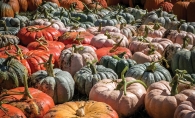A two-acre sustainable farm in Minnetrista might not exist if Stephanie Stillman hadn’t enrolled in an anthropology course in college that focused on food in America. “I think that class kick-started my interest in where my food was coming from, which led me to start learning how to grow food,” says Stillman. “It’s amazing to me that we eat three meals a day and often have no idea where our food was grown and who grew it.”
Stillman completed her anthropology degree at the University of Kansas in 2011, but what she learned in that course stuck with her after graduation, and some food production processes bothered her conscience. “It became very clear to me that I wanted to be a part of the solution,” says Stillman. “My heart spoke up, and I listened. That’s how it all began for me.” She apprenticed at an Alaskan farm in 2012, learning not only how to farm, but also how community supported agriculture (CSA) works. Stillman knew she wanted to bring what she was learning in farmer training programs back home.
And she was in luck. A cousin, Bruce Stillman, had land available for use behind his Big Stone Mini Golf and Sculpture Garden in Minnetrista. “It was very clear to me that this was the perfect space to begin Muddy Feet Farm,” says Stillman. “Big Stone Mini Golf is a beautiful artistic space that a lot of people come to see. I was excited about growing food in a place that felt more public than rural.”
The farm opened for business in spring 2013. But getting things up and running wasn’t easy work. Stillman used heavy machinery to separate paths from vegetable beds, and then started prepping all the beds by hand. “We used forks, rakes and shovels to loosen the soil. It was a big job,” she says.
Week by week, the farm took shape while Stillman learned how to run a business. “I thought I could do it all on my own and I didn’t know where I needed help or how to ask for help,” she says. “I put my everything into that farm and rarely took a day off. It literally became my life that first year.”
By its second year, Muddy Feet Farm had two drop-off locations, one in Golden Valley and one in St. Louis Park. While many CSAs require payment at the beginning of the growing season so farmers can prepare, Stillman chose to require members to purchase shares only by the month. “Everyone deserves fresh, beautiful food,” she says. “The grocery stores and even the farmers’ market prices don’t reflect the actual cost of growing food, and that is really challenging.” So Stillman strives to keep prices affordable by offering shares at around $15 a week, which feeds one or two adults, and half-shares for children under 10.
As the third growing season rolled around, Stillman began hiring help. For the 2015 year, she hired a passionate and organized farmer named Kelsey Fitzgerald to manage the farm. “Participating in [CSAs] really opened my eyes to how hard farmers work, our seasonal food choices in Minnesota, creative cooking and the local economic cycle that benefits supporting these farmers,” she says. “I want, more than ever, to be a part of the movement that goes back to feeding people real food and giving them access to it. There’s so much pride in that.”
If you purchase a share, the contents of your box will vary depending on what the farm yields that week. Members adjust their menus based on whatever they find in their box, and learn more about seasonal cooking. “We walk into grocery stores and are able to buy any vegetable at any time of year, even in the dead of winter. But with a CSA, we have the opportunity to tune in and connect with our environment,” explains Stillman. “Fresh turnips and spinach come in the spring, zucchinis and carrots in the summer, Brussels sprouts and winter squash in the fall. This is a different but natural way to think about food.”
While a growing enterprise is gratifying, the people who work the farm care most about educating people about food. From offering personal garden consultations to seed saving, the focus of the farm is on linking people with what they eat. “With a CSA, individuals become more connected with seasonal eating and more appreciative of the time taken to grow each vegetable,” says Stillman. “I believe that a CSA contributes to a healthier food economy.”
To become a member or purchase shares for the summer ($13 per week), visit muddyfeetfarm.org or email farmerstillman@gmail.com. Members can pick up their shares at the farm, or at locations in St. Louis Park, Golden Valley and Long Lake.









